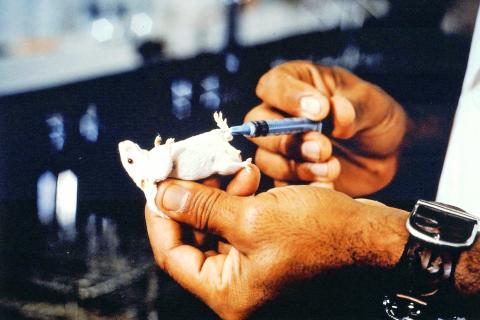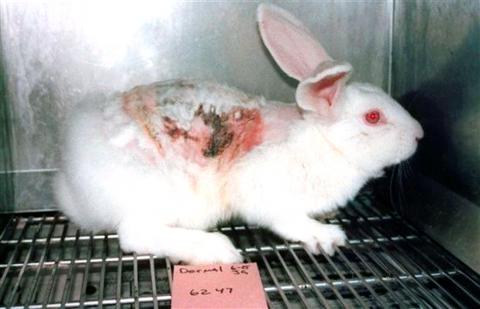The Taiwan Society for the Prevention of Cruelty to Animals (SPCA) on Monday urged the government to follow in the footsteps of China and the international community by banning animal testing for cosmetic products.
While China was the only country that had laws requiring animal testing for cosmetic products, that is no longer true after it lifted the requirement on Monday, Taiwan SPCA executive director Connie Chiang (姜怡如) said.
“This is a major step forward. Taiwan should follow this global trend. Let us distance beauty from cruelty,” she said.

Photo courtesy of Humane Society International
“The EU, Norway, India, Israel and other countries have already passed laws banning cosmetic product testing on rabbits, guinea pigs and other animals,” Chiang said.
“Australia, Brazil, New Zealand and the US have drafted bills prohibiting the sale of cosmetic products associated with animal testing,” she added.
Most Asian countries are moving in the direction of “cruelty-free” cosmetics, she said, adding that India already prohibits animal testing for cosmetic products, and last month imposed a ban on the sale of cosmetics that were tested on animals.

Photo courtesy of People for the Ethical Treatment of Animals
Chiang said Vietnam has banned the “Draize eye test,” a procedure in which drops of cosmetic ingredients are applied to the eyes of rabbits to test their effect.
The biggest progress was in China, which for the first time in 20 years amended its law on mandatory animal tests for cosmetics, she added.
“On the other hand, it is obvious that Taiwan has fallen behind on this worldwide trend,” she said.
In a statement, the Taiwan SPCA took exception to Article 7, Item 1 and Article 16, Item 1 of the Statute for Control of Cosmetic Hygiene (化粧品衛生管理條例), in which the Ministry of Health and Welfare requires that the listing of new chemicals used in cosmetic products must include technical specifications of the ingredients’ material properties.
That requirement necessitates the use of nonclinical trials for safety analysis, Chiang said.
“The nonclinical trials refer to animal testing, and these have led to companies conducting experiments on animals when they develop new products or add new chemical ingredients,” Chiang said.
“Lab workers drip chemicals into the eyes of rabbits and other animals, or apply chemicals via ointments to the animal’s shaven bare skin,” she said.
“At times, they even force-feed these animals with high doses of drugs or chemicals, which in some cases kill them,” she said.
“Scientists have in recent years proven that most forms of animal testing are unnecessary. They have shown their shortcomings in terms of accuracy of results, given that humans and animals have very different physiological reactions to various chemicals,” Chiang said.
The Taiwan SPCA said that many alternative methods to animal testing have been developed in recent years, and all of them have passed verification by the scientific community using the most rigorous international standards.
“There are more than 1,000 ingredients that have been verified as safe for human use. Compared with animal testing, [these methods] provide a faster, less costly, more humane and more reliable assessment of cosmetic product safety,” Chiang added.

A strong continental cold air mass is to bring pollutants to Taiwan from tomorrow, the Ministry of Environment said today, as it issued an “orange” air quality alert for most of the country. All of Taiwan except for Hualien and Taitung counties is to be under an “orange” air quality alert tomorrow, indicating air quality that is unhealthy for sensitive groups. In China, areas from Shandong to Shanghai have been enveloped in haze since Saturday, the ministry said in a news release. Yesterday, hourly concentrations of PM2.5 in these areas ranged from 65 to 160 micrograms per cubic meter (mg/m³), and pollutants were

Taiwan’s armed forces have established response protocols for a wide range of sudden contingencies, including the “Wan Chun Plan” to protect the head of state, the Ministry of Defense (MND) said today. After US President Donald Trump on Saturday launched a series of airstrikes in Venezuela and kidnapped Venezuelan President Nicolas Maduro, concerns have been raised as to whether China would launch a similar “decapitation strike” on Taiwan. The armed forces regularly coordinate with relevant agencies and practice drills to ensure preparedness for a wide range of scenarios, Vice Minister of National Defense Hsu Szu-chien (徐斯儉) told reporters before a

EVA Airways on Saturday said that it had suspended a pilot and opened an investigation after he allegedly lost his temper and punched the first officer several times as their plane was taxiing before takeoff at Los Angeles International Airport. According to a report published on Thursday by The Reporter, the incident occurred after the flight’s Malaysian first officer tried to warn the Taiwanese pilot, surnamed Wen (文), that he was taxiing faster than the speed limit of 30 knots (55.6kph). After alerting the pilot several times without response, the first officer manually applied the brakes in accordance with standard operating

NOT AN OPENING: Trump’s violation of international law does not affect China’s consideration in attacking Taiwan; Beijing lacks capability, not precedent, an official said Taiwanese officials see the US’ capture of the president of Venezuela as a powerful deterrent to Beijing’s aggression and a timely reminder of the US’ ability to defeat militaries equipped with Chinese-made weapons. The strikes that toppled Venezuelan President Nicolas Maduro signaled to authoritarian leaders, including Chinese President Xi Jinping (習近平), US President Donald Trump’s willingness to use military might for international affairs core to US interests, one senior official in Taipei’s security circle said. That reassured Taiwan, the person said. Taipei has also dismissed the idea that Trump’s apparent violation of international law could embolden Beijing, said the official, who was not